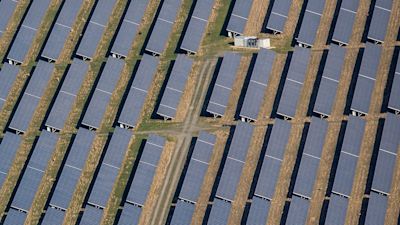Huge solar farm approved in South Gloucestershire despite concerns it will harm wildlife

Plans for a new solar farm north of Bristol have been given the go ahead despite conservationists concerns that it will harm local wildlife.
The proposals suggest installing solar panels across a 90-hectare at Perrinpit Farm, near Frampton Cotterell, in South Gloucestershire.
The renewable energy site would be able to power 14,500 homes and save almost 26,000 tonnes of CO2 a year, according to planners.
South Gloucestershire Council's development management committee voted unanimously to grant planning permission to the project on Thursday (15 September).
This is despite calls from conservationists to rethink the plans as they say the disruption and proposed use of pesticides could threaten species including skylarks, yellowhammers, brown hares, birds of prey and badgers.
A spokesperson for the 500-strong Frampton Cotterell Nature Group, said there had been no community engagement and a promised consultation with their organisation had not happened.
She said: “This is a very large solar farm and the impact on ecology has been assessed using just a desk survey and a site visit.
“The area hosts birds on the conservation concern red list including swift, sparrow, spotted flycatcher, greenfinch, skylark, yellowhammer and linnet.
“The site is part of a large area used by ravens, peregrine falcons and brown hares and the plans will restrict their habitat, and we do not know how this will affect them.
“Ground-nesting and ground-feeding birds will lose most of their open-field habitat. With habitat disruption, skylarks may well be displaced and numbers decline.”
She said the conservation group was concerned about the use of pesticides to “control mammalian pests, which may include badgers” and that there is a "plan to use herbicides for undefined invasive species".
But the meeting heard officers recommended giving the project the green light as it will result in a biodiversity net gain and the benefits of tackling the climate emergency outweigh the harms.
Will Weaver, whose family have farmed the land for more than 80 years, also said it would provide a “lifeline” to secure agriculture for future generations.
Planning agent Nick Beddoe said this is because the solar panels will be placed on lower-grade agricultural land, leaving the best fields reserved for farming.
Mr Beddoe added that biodiversity will be improved overall as a new wildlife corridor will be created, including 99 trees, 1.7km of hedgerow, a wildflower meadow and a bat house in a redundant stone barn.
“There is a limited use of pesticides proposed but this is only to prevent the spread of invasive species and to allow the proposed wildflower and other planting measures to establish. Its use would be tightly controlled,” he said.
A new bridleway will also be created to connect to the existing network while footpath gates and stiles would be upgraded, he added. A community benefit fund will also be set up for local projects.
Third-generation farmer Mr Weaver told members: “The past few years have been most trying for us – extreme weather events coupled with rising costs, the loss of farming subsidies post-Brexit and increasingly volatile sale prices for our produce have cast much doubt on the future of Britain’s family farms.
“The proposed layout will cover 30 per cent of the farm’s periphery, and we will graze the sheep under the solar panels.
“The fencing allows safe passage of small animals while preventing poaching, which unfortunately is an increasing problem in this area.
“This proposal will allow our farm to have a much greater role while still being farmed in the same vein and will provide a lifeline of dependable income to secure the opportunities for future generations here.”
In deciding to approve the plans, the council's planning manager Marie Bath concluded there would be a degree of harm at the "lower end of the spectrum" to a Grade II-listed farmhouse and a barn, but "the benefits clearly outweigh the harms."
She said: “Following numerous changes to the application, the impact on the landscape is deemed to be acceptable and it is only really visible from immediately adjacent to the site.”
The site will be returned to farmland after 40 years.
The new site will be run by Perrinpit Road Solar Limited. This is a joint venture by German companies BayWa r.e., who are based in Munich, and Grϋne Energien Solar.
Credit: Adam Postans, Local Democracy Reporter Service